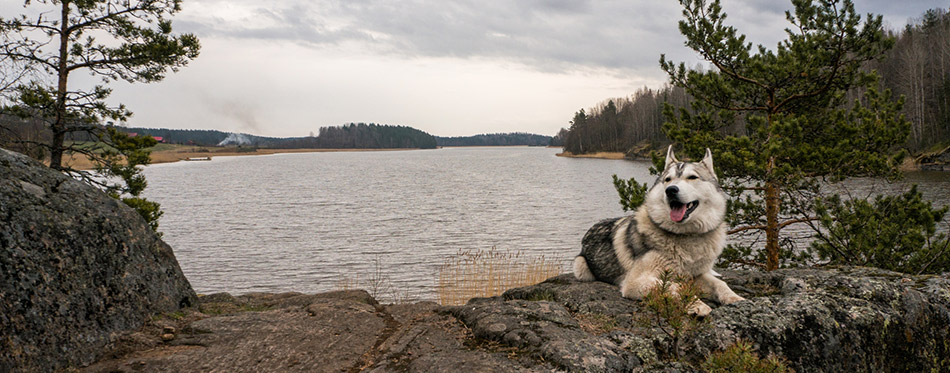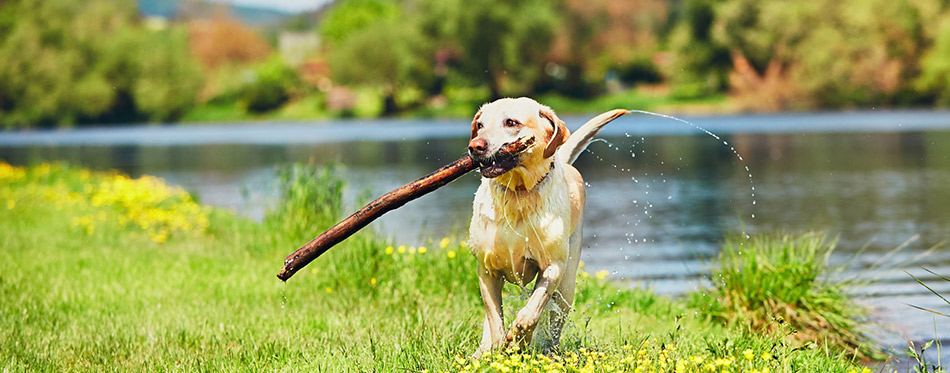More often than not, a dog’s appetite cannot be satisfied. From your dinner to blades of grass, a typical canine will eat pretty much everything. However, what’s so appealing about dirt? Owners may think that their pet mistakenly chooses to ingest dirt when out and about on their daily walks. However, the real reasons that your pet chooses to sample the ground are sometimes more sinister. With this in mind, let’s delve deeper into your dog’s rationale for eating dirt and if this habit is indeed detrimental for their overall health and wellbeing.

Pica in Dogs
As a matter of fact, experts have come up with a word for the condition describing when dogs turn to eating non-food items: pica. More specifically, the term geophagia denotes the habit of consuming dirt and is believed to be a subtype of pica. This isn’t a condition specific to dogs. In fact, the habit of intentionally eating dirt or other earth-like substances has been documented in over two-hundred different species of animals. Deer, rabbits, and even gorillas only a few of the species that observe geophagia.
The good news is that this condition doesn’t have to be connected to an underlying medical condition to originate. However, it’s always better to be safe than sorry by outlining some of the most common conditions.
Head over to our review of Dog Whistles for more options.
Underlying Health Conditions
To understand how your dog engaging in pica may mean they have chronic kidney disease, it’s important to broaden our understanding of anemia. Defined as a low number of red blood cells, dogs who have anemia often partake in pica in order to obtain the essential nutrients they’re lacking from this non-food source. Let’s explore several of the underlying health conditions your dog could be suffering from below
Hyperthyroidism: Hyperthyroidism is only condition among several involving the endocrine system that means that your dog has high levels of thyroid hormone in their blood. A high level of TSH may make your dog feel nervous, thereby causing them to eat non-food substances. Usually, however, your dog resort to eating dirt to satisfy their heightened appetite caused by the increase of hormones.
Inflammatory Bowel Disease (IBD): This umbrella term is employed to describe conditions that result in chronic inflammation of the digestive tract. Your dog therefore chews on unusual items such as dirt due to the rapidness that their food is moving through their fragile intestines.
Chronic Kidney Disease: The bodies of those suffering from chronic kidney disease see a reduction in their production of erythropoietin (a hormone that stimulates red blood cell production in the bone marrow). This erythropoietin deficiency causes anemia which, in turn, leads to pica.
When Underlying Health Complications Aren’t the Problem
It could be their kibble: Any seasoned dog owner should be aware of how important it is to feed your dog high-quality kibble. For owners who don’t understand why choosing first-rate kibble impacts everything your pet does, we urge them to think how they would feel if their diet solely consisted of McDonalds meals. Anyway, if a dog is receiving a distinct lack of essential nutrients and minerals, they’ll try to obtain these from the ground. This situation is similar to why many pregnant women observe geophagia in sub-Saharan Africa: to serve as an appetite suppressant and filler.
Your dog isn’t mentally or physically stimulated: It’s not just us humans that become easily bored. Without constant mental and physical stimulation, dogs too can suffer from boredom. This problem is breed-specific; for example, it’s uncommon for a low-maintenance lap dog to eat dirt as a result of boredom, but active, working dogs such as Labradors are more prone to suffering from geophagia.
They’ve recently undergone a massive change: Humans have lives filled with constant change. For our dogs, however, their family members and home are their whole world. That’s why when one member in their family circle suddenly disappears, it can be extremely unsettling for our pups. Eating dirt can be a coping mechanism to help them feel in control.
Your dog may just enjoy the taste of dirt: Although eating dirt seems like most human’s worst nightmare, it may be that your dog regards dirt as a tasty side dish to their kibble. As inquisitive puppies will eat anything they’re able to get their paws on – including dirt, grass, and socks in some cases – they become accustomed to the taste of dirt by developing a taste over their younger years that they actually start to enjoy dirt’s earthy flavors.
Does My Dog’s Compulsive Geophagia Pose a Problem for Their Health?
In short, yes. Your dog’s dirt-eating habit is bad for them. Although many experts argue that the answer to this question ultimately depends on whether the dirt your dog is eating is unspoiled by toxins, pesticides, and poisons, it’s only a matter of time until your dog comes across an unsafe pile of dirt. Let’s face it, us humans haven’t exactly looked after the planet that we live on. Having polluted our environment and land beyond repair, it’s only pragmatic that you seek to stop your dog’s geophagia in its tracks.
However, ingesting toxins is arguably the least of a dog’s worries when eating dirt. Think about the shards of broken glass lining the streets. You certainly don’t want these incredibly sharp shards damaging your dog’s teeth, throat, stomach, or digestive tract.
If worse comes to worst, your dog eating an exceptionally large amount of dirt in one go may impact their intestines. Impaction occurs if a dog’s colon or rectum becomes obstructed to the point that fecal matter cannot pass through. Surgery may be required to alleviate this problem.
So, How Can I Fix it?
Don’t give up hope just yet. There are, in fact, several ways your dog’s dirt-eating habits can be addressed, detailed below:
Combine training and positive reinforcement together: When in an environment with your pet that they’re both comfortable in and that has minimal distractions, why not teach them verbal cues such as “come”, “leave it”, or “drop it”? As your dog receives treats after following said commands, they’ll be far more likely to do so outside too. Once you’re out with your dog and notice them starting to munch on some dirt, using these instructions over time should result in them leaving the dirt on the ground where it belongs.
Check out our guide on the Best Dog Treats.
Spend more time with your pet: If your schedule does not allow for room to spend more time with your pup, why not ask a friend or neighbor to come by during the workday? Considering that the majority of people want nothing more than the chance to play with a dog with none of the added cost and responsibility of owning one, this will be a dream come true for most of your contacts. If none of them are available throughout the day, there are always dog walkers who charge a fair price to take your pup out for a jaunt.
Give them time: Time heals. If your dog has just suddenly started eating dirt after a massive change in their lives such as moving to a new house, for example, give them time to adjust. More often than not, they’ll return to their spritely selves in no time.
Switch up their kibble: Even if you buy kibble from a high-quality brand, this doesn’t necessarily mean a bag contains the right amount of crude protein etc. for your pup. Upgrading their food should do the trick.
Take your pet to a veterinary behaviorist: If all else fails, dog behaviorists are the specialists to approach to solve your dog’s pica problem once and for all. Given the price, we understand that many pet owners may be reluctant to do so. Yet if you’ve exhausted all other options, there is no better person to help ensure your dog returns to only sniffing dirt rather than eating it on their daily walks.
Related Post: Dog Vitamins

Final Thoughts
To conclude, perceiving geophagia to be an adaptive behavior that provides many species with minerals while deactivating toxins present in food – although this may be true – is harmful for pets. Why? Framing the condition to be beneficial rather than abnormal is all well and good for humans who can access commercial forms of dirt that have been sterilized or heated. Dogs, on the other hand, do not have the mental capacity to discern whether the dirt they’re ingesting may contain parasitic worms or detrimental amounts of lead.
Therefore, for the sake of our furry friends’ health, we must take a hard stance against our pets’ geophagia. You’ll be delighted to see your pet moving their attention away from the dirt on their walks to playing happily with other pups once again!

